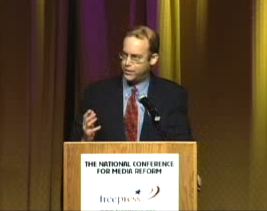$1,000 bounty: How do your members of Congress spend their day?
Our friends over at the Sunlight Network kicked off their Punch Clock Campaign today, which is offering a $1,000 "bounty" to any citizen who can get a member of Congress (or $250 for their challenger) to publicly post their daily schedule on the Internet. It's an intriguing new twist on the citizen muckraking model exemplified by the blogger campaign to reveal the senators that placed a secret hold on the earmark transparency bill.
They've already gotten one response, from Texan Alvis Yardley, who says that Rep. John Carter (R-Texas) is refusing to release his calendar due to "national security concerns"—despite the fact that the pledge only asks for the previous day's calendar. Guess we can't let the terrorists know where Carter was yesterday.

 "Media democracy" is a term that everyone defines a little differently.
"Media democracy" is a term that everyone defines a little differently. Newly-available documents detailing the early work of the "
Newly-available documents detailing the early work of the " "Regulators usually don't negotiate their budgets with the industries they oversee," writes Anna Wilde Mathews, but the
"Regulators usually don't negotiate their budgets with the industries they oversee," writes Anna Wilde Mathews, but the